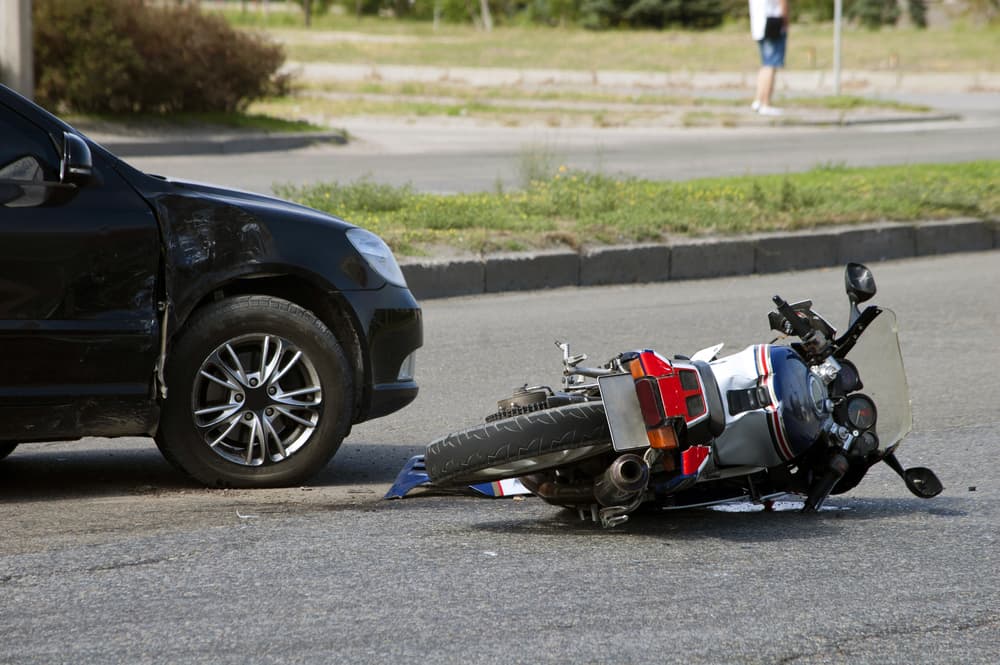What Is the Average Payout for a Motorcycle Accident?
What Is the Average Payout for a Motorcycle Accident?
If you or someone you know has been involved in a motorcycle accident, one of the most pressing questions you might have is about the potential payout or what you can expect in terms of compensation. You also might wonder what affects the payout and how a motorcycle accident lawyer can assist you.
Schedule a Free Initial Consultation
Understanding Motorcycle Accident Payouts
When it comes to understanding motorcycle accident payouts, it’s important to recognize that no two accidents are the same. The compensation each person might receive can vary widely. Several key factors can influence the money someone might get after a motorcycle accident, though.

The severity of injuries is one of the most significant factors. Injuries from motorcycle accidents can range from minor cuts and bruises to more serious injuries like broken bones, traumatic brain injuries, or even life-changing conditions.
The more severe the injury, the higher the medical bills tend to be, which is often reflected in the payout. Severe injuries might also require long-term treatment and rehabilitation, which increases overall costs.
Another important aspect is the circumstances of the accident. This includes how the accident happened and who was at fault. If another driver was entirely at fault, the payout might be higher.
However, if the person injured in the motorcycle accident is partly at fault, it could reduce their compensation. The specific details of the accident, like the speed at which it happened and the conditions on the road, also play a part in determining the payout.
The costs involved in medical treatment and other losses are also important. This includes not just the immediate medical expenses but also ongoing costs. If an injury requires ongoing physical therapy, counseling, or other forms of treatment, these costs should be factored into the payout. Additionally, if the injuries prevent someone from working, either temporarily or permanently, you can recover lost wages and the potential loss of future earnings.
Beyond the tangible costs, there’s also the consideration of pain and suffering. This is more difficult to quantify but is just as important. The impact of a motorcycle accident on an individual’s life can be profound.
They might experience chronic pain, PTSD, and a decrease in their quality of life. These aspects, while less tangible than medical bills, are integral to understanding the total impact of the accident on a person’s life.
Factors That Affect the Payout
When you’re in a motorcycle accident, figuring out the compensation you might receive is a big concern. Several factors play a role in determining the payout of a motorcycle accident claim. It’s not just about the damage to your bike or even the immediate injuries. Several things need to be considered.
Severity of Injuries
The nature and severity of the injuries you sustain in a motorcycle accident are major factors in determining the payout. Serious injuries generally lead to higher payouts. Severe injuries often require extensive medical treatment and longer recovery times.
They can also lead to major changes in your life. For instance, a severe injury might mean you can no longer do certain activities you used to enjoy, or it might require ongoing medical care.
Medical Expenses
All the costs associated with your medical treatment significantly affect the payout. This includes the expenses for your initial treatment right after the accident like emergency room visits and any surgeries or hospital stays you might need.
It also covers ongoing medical costs like physical therapy, medications, and any future medical care you might need because of your injuries. These costs can add up quickly, so they’re important to any compensation claim.
Lost Income and Earning Capacity
If you’re hurt in a motorcycle accident and can’t work, you can claim compensation for lost wages. This means the money you would have earned if you hadn’t been injured. But it’s not just about the immediate lost income.
If your injuries affect your ability to work long-term, you might also be able to claim for loss of future earning capacity. This considers how your injuries might impact your ability to earn money in the future.
Pain and Suffering
This part of the claim deals with the physical and emotional stress caused by your injuries.
Pain and suffering are more challenging to value compared to medical bills or lost income. But they’re just as important. This part of the claim acknowledges the impact of the accident on your quality of life, including things like chronic pain or emotional trauma.
Property Damage
Property damage to your motorcycle and any other personal property because of the accident is also considered in the payout. This includes the costs to repair or replace your motorcycle and any other items that were damaged. For many people, their motorcycle is a significant investment, and damage to it can be a major financial setback.
Fault and Liability
Who was liable for the accident is another factor. If the other party was entirely at fault, you might receive a higher payout. However, in some cases, if you are found to be partly at fault for the accident, it can reduce the amount you’re eligible to receive. The laws about liability and how it affects compensation can vary depending on where you live.
The Role of a Lawyer in Your Motorcycle Accident Case
Having a lawyer help you with your motorcycle accident case can make a big difference. Here’s how they can assist:
Evaluating Your Case
When dealing with a motorcycle accident, one of the first steps is to understand what your case is worth. This is where a lawyer can help. They take a close look at every part of your accident. This includes how it happened, your injuries, and how they have affected your life.
Your lawyer will consider things like medical bills, lost wages if you couldn’t work, and even how your injuries might affect you in the future. They use this information to help you understand what kind of payout you might expect.
Gathering Evidence
Collecting the right evidence is key to supporting your claim. A lawyer knows what’s needed and how to get it. They gather police reports which provide details about the accident. Medical records show the extent of your injuries.
Witness statements can also play a big part. They provide different views of what happened. Your lawyer might even get photos or videos of the accident scene. All this evidence helps build a strong case for you.
Negotiating with Insurance Companies
Dealing with insurance companies can be tricky. They often try to settle claims for as little as possible. This is where your lawyer’s negotiating skills come in. They talk to the insurance companies on your behalf. Their goal is to get you a fair settlement that covers your needs.
Lawyers understand the tactics insurance companies use and how to respond to them. They work hard to make sure you’re treated fairly and get the compensation you deserve.
Legal Knowledge and Guidance
The legal process can be confusing if you’re not familiar with it. This is another area where a lawyer is beneficial. They explain the legal steps in a way that’s easy to understand. They tell you about your rights and what to expect as your case progresses.
Your lawyer can also help you make big decisions about your case. They provide advice based on their knowledge and experience. This helps you make informed choices about what’s best for you.
Representation in Court
Sometimes, motorcycle accident cases go to court. If this happens, having a lawyer represent you is very important. Court can be intimidating, but your lawyer will be with you the whole time.
They prepare all the necessary paperwork and make sure everything is in order for the trial. In court, they present your case and argue on your behalf. They work to persuade the judge or jury to see things from your perspective. Your lawyer aims to get the best possible outcome for you in court.
Average Payouts: What to Expect
Because of the many factors involved, the payout for a motorcycle accident
can vary widely. Minor accidents with no serious injuries might result in smaller settlements, possibly covering medical bills and minor repairs.
On the other hand, accidents with serious injuries can lead to much larger settlements, reflecting higher medical costs, lost wages, and pain and suffering.
Settlements vs. Court Awards
When you’re involved in a motorcycle accident, seeking compensation usually leads to one of two paths: settling with the other party or going to court. You need to understand the differences between these options and how each one works, especially if you find yourself in such a situation.
Settlements are the most common way to resolve motorcycle accident cases. This process involves negotiation between you (or your lawyer) and the insurance company or the responsible party. The aim is to agree on an amount that compensates you for your injuries and any damage.
One of the main reasons many people choose settlements is to avoid the complexities and uncertainties of a court trial. Trials can be lengthy and stressful, and there’s always an element of unpredictability. A settlement, on the other hand, can conclude more quickly and with less emotional strain.

Additionally, settlements are usually private matters. This means the agreement’s details aren’t made public, which can be advantageous for those who prefer discretion regarding their legal issues.
Another benefit of settling is that you have more control over the outcome. In a court trial, once the case is handed over to a judge or jury, the decision is out of your hands.
Settlements allow you to negotiate and make decisions about accepting or rejecting offers. Also, settling a case is often more cost-effective than going to court. Legal fees, court costs, and the time involved in a trial can add up, making settlements a more economical choice for many.
However, your case may go to court if a settlement isn’t possible. Both sides present their evidence to a judge or jury in a court trial. This includes everything from witness statements to medical reports.
After considering all the evidence, the judge or jury will decide who is at fault and the amount of compensation to be awarded.
Court trials differ from settlements in several key ways. For one, they are public. This means that the details of your case become part of the public record, unlike the private nature of settlements.
Sometimes, court awards can exceed your best settlement offer, particularly if your case is strong and the evidence is compelling. However, consider the unpredictability of court decisions.
Court proceedings also tend to take a lot longer to conclude, which can be an issue if you need compensation quickly.
Having a lawyer to guide and represent you is helpful in both scenarios. They can manage negotiations, prepare and present your case in court, and offer valuable advice on the best course of action.
Whether you’re working towards a settlement or preparing for court, your lawyer will be beneficial in the process of recovering the best possible compensation.
Knowing these options and having professional legal support can greatly influence the success of your case.
Our team is dedicated to supporting you through these challenging decisions, protecting your rights, and working towards the most favorable resolution for your situation.
Contact a Motorcycle Accident Lawyer For a Free Consultation
The average payout for a motorcycle accident varies greatly depending on the specifics of each case. While it’s difficult to pinpoint an exact average, understanding the factors that affect the payout can help set realistic expectations.

Greg Bentley & Keith More Motorcycle Accident Lawyers
Having a personal injury attorney by your side throughout this process can be very beneficial. They can help assess your case, negotiate with insurance companies, and provide legal representation if needed.
If you’ve been in a motorcycle accident and need guidance, our team is here to help you navigate through these challenging times and work towards getting you the compensation you deserve.
To get started, give us a call at (949) 870-3800 or contact us to schedule a free consultation.


